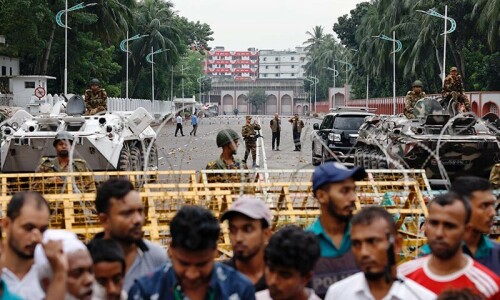
Margalla Hall was bursting at the seams on the third and final day of the Islamabad Literature Festival (ILF), as fans gathered for a glimpse of Humayun Saeed, one of the panellists at a session titled ‘Pakistani Cinema: the Rise, the Fall…and the Rise Again?’.
Mr Saeed was accompanied on the panel by Areeba Alvi, Nadeem Baig, Usman Mukhtar, Naghma Begum and moderator Raju Jamil.
There was a consensus among the speakers that today’s film industry could not compare that of the 50s and 60s. Ms Alvi, Mr Baig and Mr Saeed each, at different points, argued that today’s industry is just getting started, and would need time to develop into what the industry once used to be.
The discussion was interesting and surprisingly frank, with Mr Jamil asking panellists pointed questions about the quality of Pakistani cinema today.
At one point, as Mr Jamil lamented that the priorities of filmmakers today seemed to be dressing heroines up in costly outfits and heroes with their shirts virtually unbuttoned and asked what there is to gain from that, Mr Baig bluntly responded, to boisterous applause, “there is a lot of money to gain from that”.
It was this moment that solidified the contention at the heart of the discussion: cinema as art, and cinema as a business.
Mr Mukhtar, whose mother, the renowned actress Nasira,was also in the audience, said that producers and directors at the time that his mother was in the industry were well educated. He said that the industry today is very young, and very inspired by Indian cinema.
Referencing Bollywood director Zoya Akhtar, whose work he described as a “hybrid”, Mr Mukhtar added that while filmmaking is absolutely a business it was still possible to make good movies.
“I think commercial cinema is dumbing down. It is becoming illogical…and the justification is that this is what the audience likes,” he said.
“I say that’s fine, make commercial cinema, but you can still make logical cinema.”
Mr Saeed, who is an actor as well as a producer, spoke about the challenges that faced the film industry as well as his approach as a producer.
He said that when he began acting, he started out in television before being cast in a film around the time that the industry began dying. People were no longer going to see movies, and cinemas began shutting down. He said that it wasn’t until permission was given to screen Indian films that cineplexes began opening and people started going out to watch movies again.
He added: “We say that we copy Indian movies and so on, but that’s what we have watched our entire lives!”
Mr Saeed also noted that there are just 150 screens in the country, which means that if a movie does incredibly well it can make around Rs150 million to Rs200 million. Otherwise, he said, a movie could make around Rs80m to Rs100m.
Referencing Cake, which Mr Saeed said he watched three times, he explained that while the movie was critically acclaimed, it made about as much money as it cost to produce, meaning that it was not profitable. Even very good Indian movies such as Andhadhun, he said, are not the movies that make hundreds of millions.
He added that making films is also difficult in this society because “this is not our job” and many women still are not permitted to join the profession.
“Making a film is equal to a jihad,” he quipped.
Towards the end of the session, the panellists were joined by Naghma Begum, a veteran actress of the industry.
Ms Begum, when asked about the difference between movies today and her time in the industry, said that the difference was that of culture. Today, she said, people are smart and are trying to create their best work, whereas back then things were simpler.
“And because I worked in a lot of Punjabi films, those did well,” she added.
Published in Dawn, September 30th, 2019















































Dear visitor, the comments section is undergoing an overhaul and will return soon.